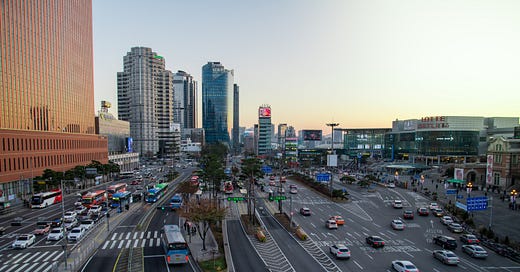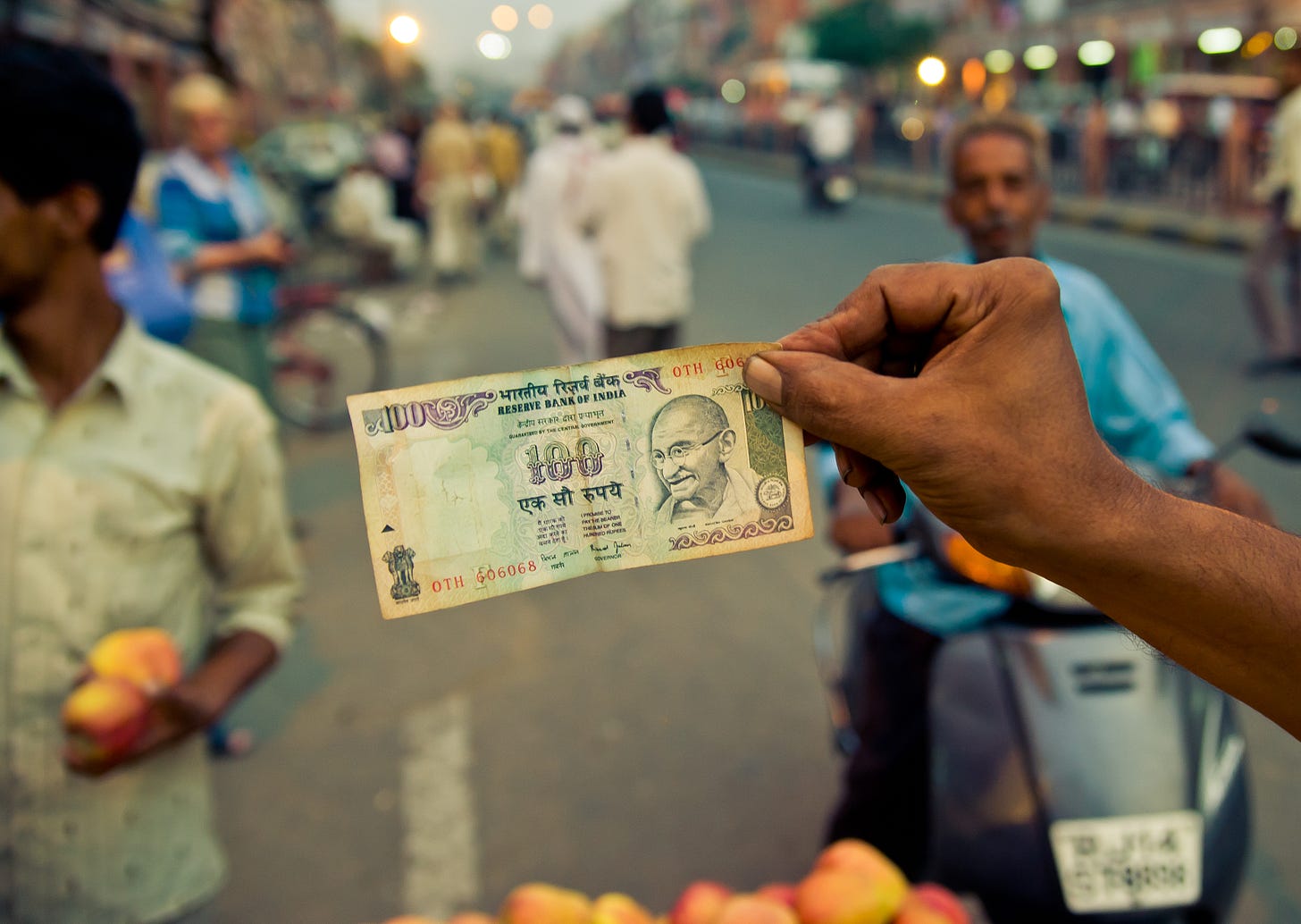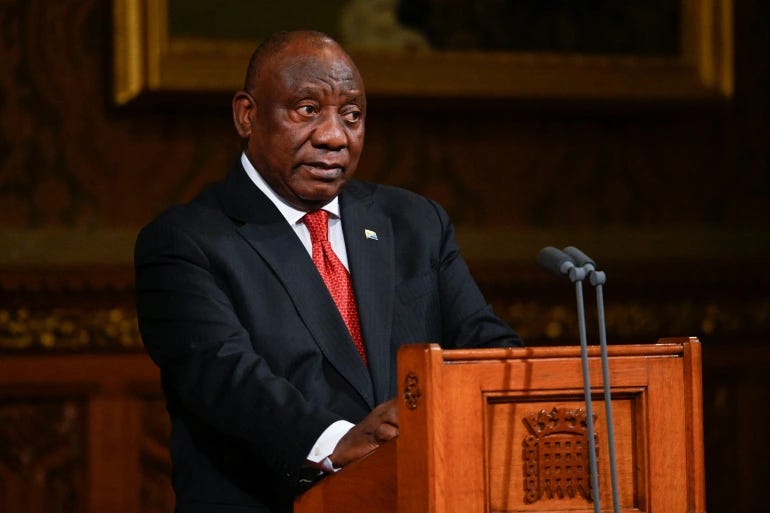Emerging Markets Monitor - December 2
EM Stocks and Bonds Rally, Malaysia's New Finance Minister, India Economy Slows, GCC Economies Sizzle, Ramaphosa Presidency Hangs by a Thread
The Top 5 Stories Shaping Emerging Markets from Global Media - December 2
EM Stocks and Bonds Stage Powerful Rebound Rally
Financial Times
“Emerging market stocks and bonds are staging a strong rebound as hopes that China will loosen its Covid-19 curbs and a dollar sell-off have helped relieve some of the pressure on developing economies.”
“JPMorgan’s broad gauge of dollar-denominated emerging market debt climbed 7.6 per cent in November, its best month since 1998, while equities tracked by MSCI’s EM index rallied 14.6 per cent in US dollar terms, the biggest rise since 2009.”
“…The bumper gains have come as investors respond to signs that this year’s rapid interest rate rises in developed economies are set to slow. Data showing that US inflation fell more than expected in October triggered a rally in bonds and equities of all stripes, but emerging assets have performed particularly well.”
“‘It does seem like the Federal Reserve may stop hiking interest rates, which has led to inflows into emerging markets,’ said David Hauner, head of emerging market strategy and economics at Bank of America. ‘Things get priced in ahead of time, and there’s a fear-of-missing-out effect when people start to see prices moving.’”
“Rising interest rates in the US and Europe have triggered record outflows from emerging market assets this year — bonds have fallen 18 per cent on a total return basis year to date, while equity prices have slipped 21 per cent — but there are signs the tide is beginning to turn.”
“In mid-November, a small weekly inflow into emerging world debt interrupted a string of outflows stretching back to August, according to JPMorgan’s analysis of data from EPFR, a research company.”
“Figures from the bank show $85bn have flowed out of EM bond funds this year, the biggest annual total since measurements began in 2005. ‘The big outflows seem to have stopped,’ said Viktor Szabo, an emerging market debt portfolio manager at Abrdn. ‘This is a market that for months has been beaten up with low liquidity, so when you finally have some buyers coming in, that’s going to make a big impact.’”
“…A wave of investor optimism that China could relax the zero-Covid policies that have held back economic growth further bolstered the equity and bond rallies…However, global growth is still expected to cool, with the US and Europe forecast to enter a recession and Latin America’s growth expected to slow to 1 per cent, according to BofA. ‘There’s still plenty of uncertainty about how EM weathers the global recession next year,’ said Szabo.” The FT reports.
Malaysia PM Ibrahim Appoints Himself Finance Minister
Bloomberg
“Malaysian Prime Minister Anwar Ibrahim appointed himself as finance chief, betting he’s the best person to sustain the country’s fragile post-pandemic recovery as the economy heads for a slowdown next year.”
“‘I want to begin a new approach and give local business people and foreign investors confidence in the economy,’ Anwar, 75, told reporters after announcing the cabinet lineup on Friday.’ Anwar was picked as premier by the king last month after the country’s first-ever hung parliament led to days of political deadlock. His move to also take the finance minister post, which isn’t unusual in the Southeast Asian nation, may also help him consolidate power and prevent infighting among the diverse groups in his so-called unity government.”
“Anwar’s immediate challenge will be to present a budget to steer the economy through the pressures of lingering inflation, a weak currency and an unfavorable global economic environment. A reformist who heads a multiracial coalition, Anwar has made protecting low and middle-income groups from rising prices the top priority of his administration.”
“Malaysia’s economic growth is projected to slow to 4%-5% in 2023 from an estimate of more than 7% this year, according to the country’s central bank. That would come after a rapid, reopening-driven rebound in 2022, which saw gross domestic product jump by 14.2% in the July-September quarter from a year earlier, the fastest pace in more than a year.” Bloomberg reports.
India Economic Growth Slows to 6.3% As Inflation, Global Headwinds Weigh
Wall Street Journal
“India’s gross domestic product grew 6.3% from July to September as global pressures on prices and supply chains, along with economic downturns in the U.S. and European Union, slowed its economic recovery.”
“In April to June, the economy grew 13.5% from a year earlier, benefiting from the easing of covid restrictions, and from a comparison to a quarter in which India’s economy was hit hard by a fierce wave of the illness.”
“Economists said domestic demand for goods and services picked up as people shopped for India’s festival-packed season, which began in September.”
“But sluggish manufacturing growth indicates that companies are wary of boosting inventory when consumers are facing higher prices on energy, food and other goods. India’s factory output declined by 0.8% in August, before rebounding slightly by 3.1% in September, according to official data. Wednesday’s data showed manufacturing shrank 4.3% in the quarter from a year earlier.” WSJ reports.
GCC Economies Set to Double Growth This Year
The National
“Swift action to mitigate the effects of the coronavirus pandemic and oil price shocks have driven a broad-based recovery in GCC economies that are set to double growth this year despite geopolitical and macroeconomic headwinds, according to an International Monetary Fund staff report.”
“Overall fiscal balances of countries in the six-member economic bloc have improved strongly, in line with the rise in hydrocarbon prices and receding effects of the pandemic, the Washington-based lender said in its latest policy paper on the GCC.”
“The primary fiscal balances of Gulf countries are expected to average 25 per cent of their gross domestic products during the 2022-2026 period as they contain expenditure.”
“‘Liquidity and fiscal support above or comparable to what was provided by most emerging economies, successful vaccination campaigns, reform momentum and recovery in oil prices and production — in line with Opec production agreements — have helped GCC countries to recover swiftly and move to a more sustained growth,’ the report said.”
“The IMF expects the oil-rich economies of GCC to grow 6.5 per cent this year, up from 3.1 per cent in 2021. The growth led by Saudi Arabia and the UAE, the two biggest Arab economies, is expected to moderate to 3.6 per cent next year.”
“The World Bank projects Gulf economies to grow 6.9 per cent this year before decelerating to 3.7 per cent and 2.4 per cent in 2023 and 2024, respectively.”
“The total economic output of the countries in the bloc is projected to reach $2 trillion in 2022, the IMF said in its Gulf Economic Outlook in October.”
“If the Gulf countries continue business as usual, the region’s combined GDP will grow to $6tn by 2050. That figure could shoot up to more than $13 trillion by 2050 if they adopt a green-growth strategy that accelerates economic diversification, the lender said.” Sarmad Khan reports.
Ramaphosa Presidency Hangs in the Balance Amid Corruption Allegations
Financial Times
“South Africa’s ruling African National Congress will meet on Friday to decide Cyril Ramaphosa’s fate, with his presidency hanging by a thread in the wake of a damning parliamentary report into a scandal over the theft of bundles of cash from his private game farm.”
“The ANC’s national executive committee will debate Ramaphosa’s future after his presidency was thrown into turmoil late on Wednesday by findings that he might have broken the law over the 2020 heist at his Phala Phala reserve.”
“The report concluded that he should be investigated for possible impeachment, prompting calls from the main opposition parties for him to step down. Ramaphosa’s authority appeared to ebb away on Thursday, fuelling speculation he was about to quit.”
“He was considering all his options and would not be ‘rushed’ into a decision, his spokesperson said late on Thursday. Yet cancelled public appearances and long consultations with the ANC all point to a grave moment for Ramaphosa’s presidency, just weeks before he was widely tipped to win re-election as the party’s leader.”
“‘It’s very, very difficult for him to survive,’ said William Gumede, chair of the Democracy Works civic foundation. Ramaphosa would need to fight to survive but ‘he’s not really a focused fighter . . . that’s been the frustration of his presidency.’”
“…The scandal might have fatally tarnished the image of the unionist turned businessman who took over the ANC’s leadership five years ago on a mission to clean up systemic corruption that grew rife under Jacob Zuma.” The FT reports.
“Let us not pray to be sheltered from dangers but to be fearless when facing them.” - Rabindranath Tagore






